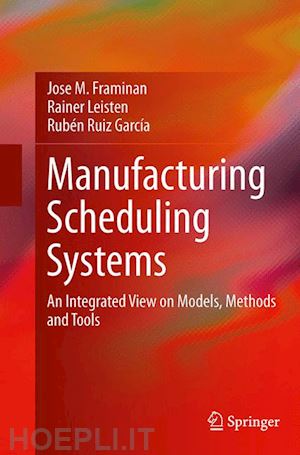
Questo prodotto usufruisce delle SPEDIZIONI GRATIS
selezionando l'opzione Corriere Veloce in fase di ordine.
Pagabile anche con Carta della cultura giovani e del merito, 18App Bonus Cultura e Carta del Docente
Manufacturing Scheduling Systems offers a comprehensive and integrated perspective on the different aspects required to design and implement systems to efficiently and effectively support manufacturing scheduling decisions. The different elements constituting a scheduling system are presented, along with an analysis of the manufacturing context in which the scheduling system is to be developed. Examples and case studies from real implementations of scheduling systems are presented to support the theoretical insights.
Manufacturing Scheduling Systems provides an overview of scheduling ‘hot topics’, resulting in a text of high appeal to a broad readership from postgraduate students in industrial engineering/operations research and business management, to practitioners in the field.
Part I: Introduction and Context
Introduction to Manufacturing Scheduling
Manufacturing Scheduling in Context
Part II: Scheduling Models
Introduction to Scheduling Models
Scheduling Constraints
Objectives
Part III: Scheduling Methods
Overview of Scheduling Methods
Exact Procedures
Approximate Methods
Multiobjective Scheduling
Part IV: Scheduling Tools
Introduction to Scheduling Tools
Advanced Design of Scheduling Tools
Part V: Scheduling Systems
Overview of Scheduling Systems
A Roadmap for Developing Scheduling Systems
Case Studies
Jose M Framinan is an Industrial Engineer and is currently Professor and Head of the Industrial Engineering and Business Management Department in the University of Seville. His research interests refer to decision systems and models in industry and services, including a range of decisions related to the design and optimization of processes, production and supply chain planning and scheduling. In these areas, he has worked intensively on both public-and privately- funded research projects along an 18-year time span, producing over 50 refereed contributions. He has been scientific advisor for a number of international (mostly European and American) research institutions. In addition, he serves in the editorial board of several journals in the domain of Industrial Engineering and Operations Research.
Professor Rainer Leisten holds a Master degree (former German Diploma degree) in Mathematics and a PhD in Industrial Management (Business Administration) from the University of Cologne. He also has professional experience as a controller in the financial industry. He received his Habilitation degree (German post-doc degree) from the University of Heidelberg and was Professor in Business Administration and Production Management at the University of Greifswald and at the University of Duisburg. Currently, he is Professor for Business Administration and Operations Management in the Faculty of Engineering of the University of Duisburg-Essen. He published numerous scientific articles in manufacturing scheduling as well as in coordination of complex planning systems and in logistics. His focus on Industrial Engineering led to numerous projects, both on the national and the international level and both with other researchers and companies.
Professor Rubén Ruiz holds a PhD in statistics and Operations Research from the Universitat Politècnica de València where he is currently a professor. He has worked in the last 12 years in production planning and scheduling and has published more than 40 articles in international journals. He is co-editor of the “European Journal of Industrial Engineering” international journal and associate editor or member of the editorial board of many prestigious journals. Apart from his academic life, Professor Ruiz has completed more than 30 R+D projects with different companies of several industrial sectors related with production planning, scheduling and logistics. He is currently director of the Applied Optimization Systems Group at the Institute of Informatics where he is closely working with companies, students and colleagues.











Il sito utilizza cookie ed altri strumenti di tracciamento che raccolgono informazioni dal dispositivo dell’utente. Oltre ai cookie tecnici ed analitici aggregati, strettamente necessari per il funzionamento di questo sito web, previo consenso dell’utente possono essere installati cookie di profilazione e marketing e cookie dei social media. Cliccando su “Accetto tutti i cookie” saranno attivate tutte le categorie di cookie. Per accettare solo deterninate categorie di cookie, cliccare invece su “Impostazioni cookie”. Chiudendo il banner o continuando a navigare saranno installati solo cookie tecnici. Per maggiori dettagli, consultare la Cookie Policy.